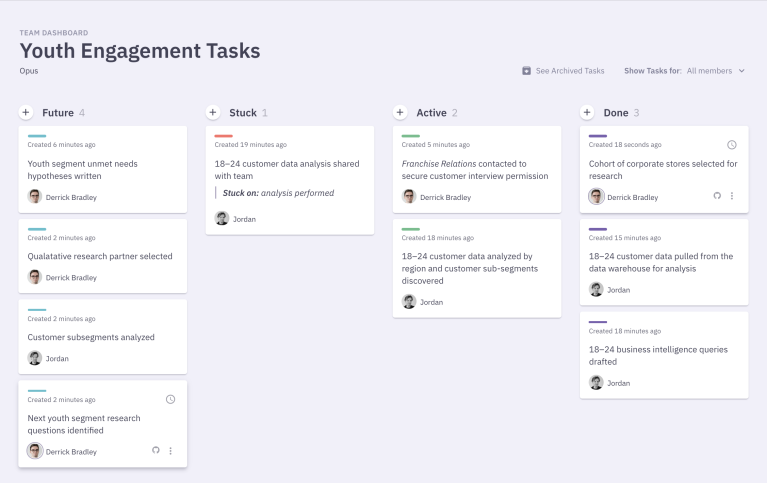What is Parabol’s Friday Ship?

As our mission-driven team does its work, it will encounter challenges. A team member may lack the authority to make a decision or need work reviewed before they are allowed to proceed. When situations like these occur they’ll move the blocked task on the sprint board from “Doing” to “Stuck.” Challenges like these can often be resolved inside the team. Occasionally a team will need outside intervention to grant it permission or additional resources. For the team to get the right sort of help, it’s essential outside stakeholders be kept informed. In a mission-driven team, keeping stakeholders informed is a regular weekly activity. It’s called the “Friday Ship.”
A Friday Ship is a short note written by the team and sent to its stakeholders at the end of each week to share information on what’s changed, highlight where the team is stuck, and ask for help or feedback. It is often shared as an email or an intranet post. What’s most important is what a Friday Ship isn’t: it isn’t overly produced, it isn’t a presentation or a fancy “executive dashboard,” and it most certainly isn’t candy-coated to gloss over challenges the team is encountering. It’s the short, unvarnished truth.
Consider our Blockbuster team. At the end of their 1st week, their Friday Ship might read:
The Youth Engagement Team is underway! This is the end of our first week together as a new team. We’ve prioritized our time in our first 2-week sprint to query and analyze the data we have within our warehouse to refine our understanding of our 18–24-year-old customer segment. Our aim is to see if we can determine which sub-segments exist, organize them into candidate persona, and come up with a set of initial research questions to figure out the difference in needs and habits between our strongest customers and our weakest customers.
What’s next:
- Analyzing the data and identifying sub-segments
Where we need help:
- Nothing this week!
A few weeks in, their Friday Ship might read:
Our analysis has revealed two important factors among 18–24 year-old repeat customers: the customer’s age and their economic bracket. We were surprised to find other factors—e.g. geography, genre preference—do not matter. What’s disturbing within our findings is: the younger you are or the wealthier you are, the less likely you are to be a good Blockbuster customer. We suspect there is something about the needs and behaviors of high-income teenagers we must understand. We’ve spent the remainder of this sprint creating a random sample of stores to include in our qualitative research. We need your help conducting this research. Please read on.
What’s next:
- Selecting our qualitative research provider from among the 4 bids we’ve received
- Kicking off with our research provider
Where we need help:
- The Franchise Relations department has not been responsive to us, we need help securing time and reaching customers from non-corporate stores in our sample—can you please elevate our need with the leader of this group?
Seeking Help & Feedback
The last section of this message, “where we need help,” is used to get the team unblocked by asking for outside help. Here, an executive stakeholder may simply forward this Friday Ship along to the head of Franchise Relations and ask, “can you please get back to the Youth Engagement team? It’s urgent.”
The “Where we need help” section may also be used to request reviews of draft deliverables. If a team is working on a presentation, report, or designing something, interim work can be linked or attached to the Friday Ship with a request for specific feedback from the stakeholders. This work may be rough and imperfect (and that’s good!) Getting into the habit of sharing early and often has many benefits:
- Better momentum: work is always shared Fridays, so everyone has something ready
- Better products: feedback is integrated early before the item is completed, improving quality
- Better stakeholders: when outside team members feel they have a voice, they become more usefully involved
Breadcrumbs
As the team does its work and the weeks roll by, the aggregate of Friday Ship briefs become a valuable chronicle of the team’s efforts. When it comes time to re-prioritize the team’s Backlog or consider how to improve the way the team has been working during a Retrospective, having a tidy summary of the things the team tried and how they went serves as a valuable input to figuring out what sorts of things the team should do more of and avoid in the future.




